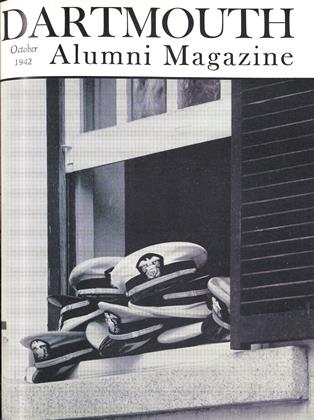IN THE AUGUST ISSUE of the MAGAZINE appeared an article by Prof. Donald L. Stone explaining opportunities for alumni service in various branches of the armed forces. Since publication of that article, announcement has been made by Admiral- Randall Jacobs, Chief of Naval Person- nel, of the establishment of Class V-i 1, U. S. Naval Reserve.
This new class should be of interest to all alumni, andespecially to those who, up to this time, have been rejectedfor Naval service because of slight physical defects.
An applicant for enlistment in Class V-11 must qualify under the following requirements: (a) Be a male citizen of the United States, (b) Be under 39 years of age. (c) Meet physical requriements as prescribed by the Manual of the Medical Department for commission in the Naval Reserve except that certain physical defects may be waived for Spe- cial Service, (d) If under 30 years of age, possess a Baccalau- reate degree from an accredited college or university plus at least one year's business or professional experience or grad- uate work in college. If 30 years of age or over, possess credit for two years' work in an accredited college plus successful business or professional experience since leaving college.
In general, Class V-i 1 is for candidates who are more ma- ture than those enlisted in Class V-7. No candidate who has held his Baccalaureate degree less than one year will be en- listed in Class V-11 unless he is 28 years of age or older. Those who are under 28 years of age, and are physically and otherwise qualified for general service (except aeronautical engineers) will be given the course prescribed for Reserve Midshipmen leading to commissions in the D-V (G) or E-V (G) classification. Others will enter special service.
Candidates who present acceptable evidence of birth and citizenship and who are considered good officer material may be enlisted as apprentice seamen, Class V-11, by the Naval Officer Procurement Service. Such candidates will be retained on inactive duty for go days while the application for commission is completed and processed.
When and if the application is found acceptable, the can- didate will be ordered to indoctrination school for thirty days' intensive training, at the end of which time those who have demonstrated satisfactory ability and aptitude for the service will receive probationary commissions and go on for further intensive training.
The following is directly from Admiral Jacob's letter.
"Enlistment of candidates with the following physical de- fects is authorized for Special Service: Vision—Each eye correctible to 20/20.
Defective Color Perception—lf the individual possesses desirable general qualifications, and the defect is not in- compatible with probable duties.
Height—Minimum g ft., 4 in. Maximum 6 ft., 4 in. Weight—ln proportion to height, and general body build
Teeth—Malocclusion in which there is no interference with biting or masticatory function, provided there is no impingement on the gingiva. No specific number of natural teeth is required but natural teeth must be in good repair, the supporting tissues free of disease. There must be suffi- cient satisfactory replacements of missing teeth to provide effective biting and mastication. Flat Feet—li asymptomatic.
Deficient Chest Expansion—Unless indicative of poor physique or pulmonary disease.
Hay Fewer—Unless disabling to such an extent as to re- quire treatment, or if accompanied by other allergic mani- festations.
Though much of the above material is taken directly from Admiral Jacob's letter, we suggest that further details con- cerning enlistment in Class V-n, USNR, be secured from any Naval Recruiting Station.
 View Full Issue
View Full Issue
More From This Issue
-
 Article
Article'Round the Girdled Earth
October 1942 By John French JR. '30 -
 Lettter from the Editor
Lettter from the EditorLetters from Tom Braden '40
October 1942 -
 Article
ArticlePresident's Address Opens 174th College Year
October 1942 -
 Article
ArticleDartmouth War Directory
October 1942 -
 Article
ArticlePay-As-You-Go Taxation
October 1942 By BEARDSLEY RUML '15 -
 Class Notes
Class Notes1918*
October 1942 By ERNEST H. EARLEY, DONALD L. BARR







